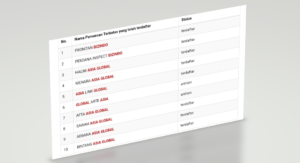Imagine if you have just landed in Jakarta or Bali, bringing along big plans to launch a business in Indonesia. The market’s massive, the opportunities are mouthwatering, anything from building a resort in Lombok to kickstarting a green energy project in Sumatra. But then reality hits. When it’s time to register your company, you run into bureaucratic nightmares: notary deeds with the wrong format, delayed verifications, rejected documents. Frustrating, right? Don’t worry. In 2025, the Indonesian government is pushing to simplify the whole process through the updated Online Single Submission Risk-Based Approach (OSS RBA) system.
Although the system is now much more advanced, there are still challenges that can leave expats scratching their heads. In this article, we’ll break down the latest OSS rules, how to set up a Foreign Investment Company (PT PMA) hassle-free, and share tips to get your business running fast. Let’s dive in.
Read also: Prabowo Administration to Implement Economic Deregulation in Response to Global Uncertainty
In 2025, Indonesia continues to attract global investors. The Investment Coordinating Board (BKPM) is aiming for IDR 1,905.6 trillion in total investment. Countries like Singapore, Hong Kong, and China have already poured capital into Indonesia. For expats or foreign entrepreneurs, setting up a PT PMA is the essential first step to entering the market.
A PT PMA is a company that allows foreign ownership—but the process isn’t as simple as launching a startup in Silicon Valley. You’ll need a notarial deed, BKPM approval, a Business Identification Number (NIB) from OSS, and a taxpayer number (NPWP) to operate legally. Sounds like a lot? True—but the 2025 OSS RBA was built to speed things up, especially for low- or medium-risk businesses.
What Is OSS RBA?
So, what exactly is OSS RBA? It’s a risk-based business licensing system introduced in July 2021, based on Government Regulation No. 5/2021 on Risk-Based Business Licensing, linked to the Job Creation Law (Law No. 11/2020).
This system replaces OSS 1.1 and categorizes business licensing by risk level:
- Low risk: only requires an NIB
- Medium-low or medium-high risk: requires NIB + Standard Certificate
- High risk: requires NIB + full licensing documents
Foreign-owned companies (PT PMA) generally fall into the high-risk category, which means tighter checks, document verification, and additional permits. If your documents are complete, you can get an NIB in as little as 48 hours for simple businesses. But for PT PMAs, it usually takes 3–5 days due to extra validation.
Here’s the cool part—OSS is now linked to the Coretax system for automatic NPWP registration and the Ministry of Law and Human Rights (AHU) system for verifying notarial deeds. BKPM has also introduced a new dashboard that’s easier to use, with real-time notifications for verification status. So yes, you can monitor your NIB approval while sipping coffee in Canggu.
Still, It’s Not All Smooth Sailing
However, don’t get too comfortable. Advanced systems don’t always mean drama-free experiences. Many foreign business owners have voiced frustrations about OSS RBA. For example, notarial deeds being rejected because the format doesn’t meet AHU standards, or company data failing to sync due to outdated records in AHU’s database.
Others get stuck on things like a company domicile letter—which has to be verified by the local subdistrict office and can be tricky depending on the area. PT PMAs often face extra hurdles, like needing an environmental impact assessment (AMDAL) for manufacturing or tourism permits for resorts in Bali. Some X (formerly Twitter) users complained they had to wait weeks because the system requested unclear documents—like inconsistent domicile certificates from different regions. For expats unfamiliar with Indonesian, it’s like taking a quiz with no answers.
How to Set Up a PT PMA in Indonesia
So, what do you need to prepare to establish a PT PMA?
- Notarial Deed of Establishment – This outlines your company name, address, and share structure. You’ll need at least IDR 10 billion in capital (excluding land and buildings), though this can be a commitment—not full cash upfront.
- Passports and Stay Permits – Foreign directors or commissioners must submit their passports and KITAS if they live in Indonesia.
- Foreign Worker Plans (RPTKA) – If you’re hiring expat staff, you’ll need an RPTKA via OSS.
- Company Domicile Letter – This one can get tricky due to the need for local verification.
- Sworn Translations – All foreign documents like contracts or certificates must be translated into Bahasa Indonesia by a sworn translator.
Once everything’s ready, enter your data into the OSS RBA, apply for the NIB, and wait for approval. If successful, the NIB unlocks access to open a bank account and register for taxes through Coretax.
Regulatory Snags Still Exist
But it’s not always smooth sailing. Besides technical glitches, some industry-specific regulations can be a headache. For instance, green energy sectors allow 100% foreign ownership, but media is capped at 49%. Businesses in Special Economic Zones (SEZs) like Mandalika may enjoy more relaxed ownership rules.
Opening a bank account for your PT PMA isn’t always easy either. Bank Indonesia requires complete documents like the NIB and NPWP. While large banks like BCA and Mandiri are more experienced, smaller banks may drag the process. Branding is another must—an online presence in Indonesia is non-negotiable. Katadata reports that 65% of urban consumers in cities like Jakarta and Bali check a business’s website before making a purchase. So, a slick website isn’t just an option—it’s a necessity.
Tips to Avoid OSS RBA Headaches
How do you avoid losing sleep over OSS?
- Double-check your documents – Make sure your notarial deed meets AHU standards, passports and KITAS are valid, and translations are complete.
- Understand your sector – If you’re launching a resort, get the right tourism permits. In energy? Secure your AMDAL from the start.
- Submit LKPM reports every quarter – This is mandatory for PT PMA to avoid penalties.
- Work with a local partner – They can help track your verification status, fix rejected documents, and advise on foreign shareholding rules.
Bizindo Can Help You Cut Through the Red Tape
This is where Bizindo comes in to make your life easier. For years, we’ve been helping expats and foreign investors set up PT PMAs without the hassle. From preparing notarial deeds, submitting NIB applications in OSS, to ensuring your documents meet BKPM standards, Bizindo is ready to assist.
Need certified translations? Our Sworn Translator Service ensures your documents get approved. Confused by sector regulations or shareholding limits? Our Corporate Advisory team provides the right solutions. Want to stand out fast? We’ll build a professional website that attracts clients from Jakarta to London. With Bizindo, setting up your PT PMA is not only fast—but lets you focus on strategy, not paperwork.
So, what are you waiting for? In 2025, Indonesia is throwing open its doors to foreign investors. With OSS RBA becoming more refined and the market always buzzing, now’s the time to realize your business dreams. No more fear of rejected documents or confusing rules—Bizindo is here to support you every step of the way.
Contact Bizindo Now!
Planning to launch a PT PMA in Indonesia? Let Bizindo handle everything—from company registration, sworn translations, to building a stunning website. Save time, skip the stress, and start strong. Visit www.bizindo.com and let’s turn your 2025 business dream into reality!





 20% off today. Whatsapp us!
20% off today. Whatsapp us!